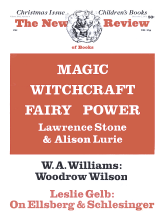In response to:
What Went Wrong? from the October 21, 1971 issue
To the Editors:
Must we, at this late date in the history of the novel, be subjected to the kind of silly frothings at the mouth found in Roger Sale’s assault on The Blood Oranges [NYR, October 21]? “We have only the nightmare vision of a narrator unable to see how awful he is,” says Mr. Sale. But the narrator, through the elaborate meanderings of his tale, through his self-justifications, through his insistence on the glory of his adulterous life, is showing us “how awful” he is, through (one is almost ashamed to point this out) the artifice that is Mr. Hawkes’ novel. How is it possible that a reviewer cannot know that a first-person narrator is also an invention of the author, as much as setting or conversation is? One suspects, with a sinking feeling, that Mr. Sale is representative of hidden thousands, that he somehow thinks that fiction is “real,” or worse, that it should be.
Mr. Sale goes on to say that many of Mr. Hawkes’ admirers “will note that I have completely missed the fact that it is all a put-on.” The Blood Oranges is, of course, not a put-on, but a wholly realized tale of meanness and tragedy, related by a narrator who is revealed (not to Mr. Sale, I assure you) to be as mean and tragic as the tale itself. “When horror becomes a pastime,” Mr. Sale notes, “it should announce itself or at least know itself.” The “announcing” and the “knowing” are both accomplished—by the novel that Hawkes has given us.
Yet further, Mr. Sale speaks of the “narrator and author” as if they are one. One is amused at what Mr. Sale might have to say of the inseparability of John Dowell and Ford Madox Ford, or, for that matter, of Nick Carraway and Scott Fitzgerald. Mr. Sale’s cheaply trite attack on Hawkes’ masterpiece is a disgrace to a profession that, one thought, has already sufficiently disgraced itself.
Gilbert Sorrentino
New York City
Roger Sale replies:
It had to happen. The least I can assure Mr. Sorrentino is that his anger and contempt are not surprising. A few years ago, when I complained that Mary McCarthy’s The Group was a tedious book. I was told by a number of her admirers that of course the narrator is tedious, that is the point, etc. I remember someone coming, or so he thought, to the rescue of Ian Fleming after Fleming had been attacked as a vulgar, showy, sadistic writer, and the terms of the rescue were the same: of course James Bond is vulgar, showy, sadistic, that is the point, etc. If you can’t call it a parody, call it a careful study of the vices in question.
It is clear that Mr. Sorrentino and I have read the same novel; I would know much less easily how to reply if he had questioned my moral sensibilities rather than my critical capacities. If he is happy imagining that John Hawkes is cunningly, knowingly, carefully standing aloof from his narrator, fine. I can’t really see what difference it makes. A novelist thus aloof is the same thing as no novelist at all. Certain Bay Area people like to think of the San Francisco Chronicle as a secret underground newspaper, and presumably they are delighted to read it that way. I find it dull and depressing either way, just as I did The Blood Oranges; imagining it to be all intentional helps not at all, because that intent, if there, changes nothing on the page, informs and shapes nothing.
What is happening in The Good Soldier or The Great Gatsby, or All the King’s Men or The Turn of the Screw is different because in each case the authorial pressure on the narrator is there, demonstrable, not the least hypothetical. I perhaps give myself away, though, by adding that I find none of these books as good as many people do precisely because so much investment is being made in the narrator as a character and the narrators are not very interesting. There are, of course, great first person narrators—Ishmael, Huck, Nelly Dean, Pip—but I suspect that after Flaubert, James, and others made the world self-conscious about all such matters the self-consciousness itself began to become the interest, and relatively minor matters like authorial distance and narrative stance began to seem of prime importance. Ralph Ellison in Invisible Man practically destroyed a great novel—in the eyes of many he did do so—by all his fussing about just these matters.
But all this is almost irrelevant to The Blood Oranges where, on both Mr. Sorrentino’s account and mine, we have a boring, hateful narrator. To imagine John Hawkes standing either squarely behind him or at a great and cunning distance from him changes nothing; in either case the man doing the manipulating is dabbling in the boring and hateful, understanding what he is doing only in ways that seem to me, to repeat, contemptible. Much more interesting books along the line of the book Mr. Sorrentino says Hawkes is writing have been written by Charlotte Armstrong and Margaret Millar.
This Issue
December 2, 1971



